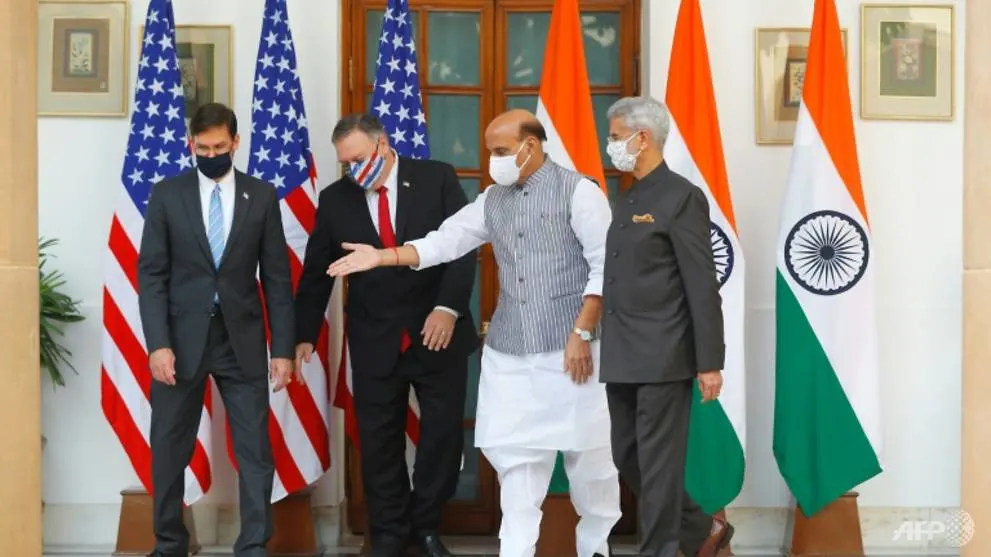Eyeing China, US and India accelerate defence bonds
29 October, 2020

Two days of meetings by the top US and Indian diplomatic and defence chiefs in New Delhi underscored a desire for growing military cooperation driven by mutual distrust of China.
Deadly clashes between Indian and Chinese troops over a disputed border region have given the Pentagon fresh fuel to draw Delhi closer, since it seeks a coalition to counter what the united states sees as the rapid expansion of China's military presence across the Indo-Pacific region.
In two days of talks on Monday and Tuesday, couched as the 3rd gross annual 2+2 discussions, US Secretary of State Mike Pompeo and Secretary of Defense Mark Esper decided to tell India geospatial satellite and sensor intelligence.
They laid the groundwork for more military exchanges and cooperation on cybersecurity and space, and increasing arms sales, the united states particularly pressing India to get US F-18 fighter jets for its navy.
And both sides cheered the addition of Australia to the upcoming Malabar exercises in the Indian Ocean, joining the united states, Indian and Japanese navies, an informal relationship now dubbed The Quad.
"I think the tide has turned," Pompeo told Indian newspaper The Print.
"I think the world has begun to discover the threat posed by the ideology that hails from the Chinese Communist Party. Therefore yes, I believe my Indian counterparts get that."
WASHINGTON ANXIOUS
The US is anxious to build partnerships to hem in China's expansion, and India is an integral focus.
The Delhi talks took place just days after Washington piqued China with the announcement of the sale of several billion dollars' worth of advanced military systems to Taiwan.
And rigtht after the talks, Pompeo travelled to Sri Lanka and the Maldives, where China has sought strategic inroads.
US Secretary of Defense Mark Esper (2nd L) and Secretary of State Mike Pompeo (L) lay wreaths at the National War Memorial in New Delhi on Oct 27, 2020. (Photo: AFP/Jewel Samad)
The deadly confrontation between Chinese and Indian troops in a remote, disputed part of their long border earlier this season then played into US hands as it seeks to rally a worldwide anti-Beijing movement.
India has requested US support, from endorsing its position diplomatically to supplying satellite intelligence and special winter gear.
In New Delhi the united states eagerness was palpable.
"This can be the most, one among the most, consequential relationships for the United States in this century," Esper told reporters.
Amid the talks, Pompeo and Esper set time to go to India's National War Memorial. In a well-choreographed ritual, they laid wreaths of white flowers and stood silent for a good two minutes. No other senior US official had ever done so.
And Esper, along with his wife, were able to tour three New Delhi cultural sites, including a museum to Gandhi and the Red Fort, to underline their interest in the united states.
NO LONGER NON-ALIGNED?
Officially India hews to an insurance plan of "strategic autonomy", Modi's updated iteration of its famous principle of non-alignment.
However in reality Beijing's challenge has pushed New Delhi off the fence.
"The border spat in Ladakh has woken New Delhi up to the truth of the China threat," said Michael Kugelman of the Wilson Center in Washington.
"THE UNITED STATES and India are actually on a single page when it comes to China threat perceptions."
Harsh V Pant, Head of Strategic Studies at the brand new Delhi-based Observer Research Foundation, said India is now in the "same league" as countries around the South China Sea, facing Chinese claims to sovereignty that overlap theirs.
"India has discarded non-alignment way back when but loves the rhetoric of non-alignment," Pant said.
Still there are limits. The refusal of counterparts Minister of Defence Rajnath Singh and Minister of External Affairs S Jaishankar to say China in statements towards the end of the 2+2 summit raised a question of if they are really up to speed.
Pant says that's understood, however, and US officials agreed.
"This is a very critical time and everyone is racking your brains on best responses to the situation," Pant said. "And since we are also holding talks with them - we need to be very sensitive in what we say and what we don't."
Washington remains patient, likewise hoping to sink a hook with the sale of F-18s, which would improve the potential for inter-operability.
Yet no-one is talking about a formal alliance that would include, as the United States does in more committed partnerships, joint military patrols.
"Washington views its top defence partners as allies that are prepared to partner operationally," Kugelman told AFP.
"New Delhi, however, continues to insist upon the principle of strategic autonomy, which rules out its participation in military alliances."
Source:
